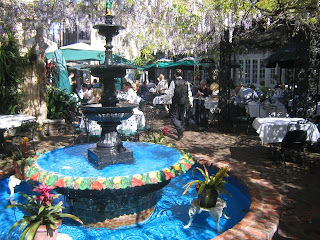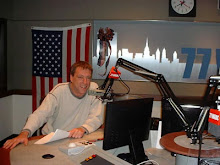 Arlo Guthrie's the "City of New Orleans" was playing on my I-pod as the the train crossed Lake Pontchartrain and into the crescent city. The "City Of New Orleans" has been running from Chicago to the Gulf coast town since the 1940's. But, I was on Amtrak's Crescent, a 1300 mile excursion through the south from New York. Still, Guthrie's 1971 folk hit set the mood.
Arlo Guthrie's the "City of New Orleans" was playing on my I-pod as the the train crossed Lake Pontchartrain and into the crescent city. The "City Of New Orleans" has been running from Chicago to the Gulf coast town since the 1940's. But, I was on Amtrak's Crescent, a 1300 mile excursion through the south from New York. Still, Guthrie's 1971 folk hit set the mood."All along the southbound odyssey the train pulls out of Kankakee Rolls along past houses, farms & fields Passin' graves that have no name, freight yards full of old black men And the graveyards of rusted automobiles Good mornin' America, how are you? Don't you know me? I'm your native son! I'm the train they call the City of New Orleans I'll be gone 500 miles when the day is done "
This wasn't just about a trip to New Orleans, it was about riding the rails. I've done this trip two times before and it never gets old, despite the 32 hour long ride. As hundreds of passengers in coach dealt with screaming babies, snoring men and farting fat guys, I lay comfortably in a compact, but efficient sleeper compartment. My tiny room had two beds, one that lowered from the roof of the high ceiling car and the other made up by folding together two face to face coach seats.

The compartment had it's own toilet and sink. The shower was down the hallway. The larger rooms had a sofa and a shower.
"And the sons of Pullman porters & the sons of engineers Ride their fathers' magic carpets made of steel. Mothers with their babes asleep, rockin' to the gentle beat. And the rhythm of the rails is all they feel. Good mornin' America, how are you? Say don't you know me? I'm your native son! I'm the train they call the City of New Orleans. I'll be gone 500 miles when the day is done. "
Claude was the attendant on our way down and Steve took care of our sleeper car on the way back to New York. I mention their names not just because they made my journey a blast, but because they are both survivors of Hurricane Katrina. Real survivors.

Both lost their homes during the storm and both relocated. You could tell they had told the story a hundred times before, but it didn't make telling it any easier for these two men, both born and raised in New Orleans and employees of the railroad for decades.
"Night time on the City of New Orleans Changin' cars in Memphis, Tennessee Halfway home, we'll be there by mornin'. Thru the Mississippi darkness rollin' down to the sea. But all the towns and people seem to fade into a bad dream. And the steel rail still ain't heard the news. The conductor sings his songs again "The passengers will please refrain: This train got the disappea rin' railroad blues "
 The trip by train from New York to New Orleans takes 32 hours. By car, just over 20 and by plane about three hours. So why would anyone in their right mind take a train. Three reasons, really. Many people don't like flying. Some do it because in coach, it's cheaper than flying, but for me, I'm just a train buff. I've traveled on train from Denver to California, from New York to Chicago, from San Diego to Santa Barbara and from Denver to New York. I've always been fascinated by trains and train travel since my late grandmother took me on my first train trip, a ride on Philadelphia's elevated Broad Street line.
The trip by train from New York to New Orleans takes 32 hours. By car, just over 20 and by plane about three hours. So why would anyone in their right mind take a train. Three reasons, really. Many people don't like flying. Some do it because in coach, it's cheaper than flying, but for me, I'm just a train buff. I've traveled on train from Denver to California, from New York to Chicago, from San Diego to Santa Barbara and from Denver to New York. I've always been fascinated by trains and train travel since my late grandmother took me on my first train trip, a ride on Philadelphia's elevated Broad Street line.The Crescent pulled into New Orleans around 7:30PM on the second day. After checking into the hotel, I hit the streets of the French Quarter. Claude and Steven told me about a couple of bars where I could find authentic jazz and blues. One of them was the Funky Pirate on Bourbon street. The sleeper car attendant told me I had to catch the nightly show by Big Al. But, How would I know it's him when I walk in? Claude said "you won't miss Big Al." He was right.

Big Al Carson is a legend in these parts. He's belted out tunes with the best of them and he packs the joint five nights a week.
It's a show you don't want to miss. The guy knows he's fat and he jokes about it. He has a good sense of humor and the show is worth the cost of the over-priced drinks and smokey surroundings. I can't remember the lady's name, but the woman who was singing the blues behind the piano at Lafitte's Blacksmith shop was a blast. I came back twice to see her during my three night stay in "Nawlins." There's a couple of reasons to stop here. For one, good music. But, this place has history. It was built somewhere before 1772 and survived two fires, one in 1788 and another in 1794 that destroyed most of the city. One of my biggest treats was convincing the lady singer to give a whirl at Arlo Guthrie's "City of New Orleans." She did a great rendition, as the eight people around the piano sung along to every word.
I can't remember the lady's name, but the woman who was singing the blues behind the piano at Lafitte's Blacksmith shop was a blast. I came back twice to see her during my three night stay in "Nawlins." There's a couple of reasons to stop here. For one, good music. But, this place has history. It was built somewhere before 1772 and survived two fires, one in 1788 and another in 1794 that destroyed most of the city. One of my biggest treats was convincing the lady singer to give a whirl at Arlo Guthrie's "City of New Orleans." She did a great rendition, as the eight people around the piano sung along to every word.
"Good night America, how are you? Say don't you know me? I'm your native son! I'm the train they call the City of New Orleans. I'll be gone 500 miles when the day is done. "
Besides the French Quarter, you should take the Charles Street trolley into the Garden district, a residential neighborhood filled with ornate Victorian mansions and anchored by Tulane University and Loyola College.
The trolley passes Audubon park and the city zoo, but you had better know the rules of the trolley. The grumpy drivers won't give you change and you can't get on and off along the way, unless you pay the full fare again . They'll hand you a transfer, but it can only be used on the buses.
I could write an entire blog on where to eat, but I'll mention two places. 
First there's the Court of Two Sisters on Royal street. Their daily brunch buffet is well known in New Orleans. At $28.oo a person it's an expensive feast, but the food is great and the view is even better. The courtyard at Two Sisters is worth the price of brunch. The service is impeccable and the view unmatched. A three piece jazz band plays in the background.
If you're looking for authentic New Orleans creole and Cajun cookin, look no further than the Gumbo Shop. They do it all here and some of the world's most renowned chefs have eaten here to learn a trick or two about Cajun cooking. Order the combo platter and you'll get a sample of three of their most popular dishes.
I'd be remiss if I didn't end this story by mentioning Hurricane Katrina and the effect it's had on the people of New Orleans. The city's population has shrunk in half to about 200,000. Most of those people never came back when they were evacuated to surrounding states. Those that did stay rebuilt or re-located to another neighborhood in New Orleans.  Their spirits are high, but you can see the pain in their faces when you ask them to talk about it. Some told me they had no insurance. Others talked about the fear of another Hurricane and the lack of confidence that the levees will hold back another major flood. Mother nature rarely picks on the rich. She gobbles up trailer homes in the Midwest and wood shanties in New Orleans 9Th ward.
Their spirits are high, but you can see the pain in their faces when you ask them to talk about it. Some told me they had no insurance. Others talked about the fear of another Hurricane and the lack of confidence that the levees will hold back another major flood. Mother nature rarely picks on the rich. She gobbles up trailer homes in the Midwest and wood shanties in New Orleans 9Th ward.
The French Quarter and the wealthy Garden district were barely touched by the wrath of Katrina. Here in New Orleans, people refer to present-day New Orleans as Post-K. I bought a Cajun cookbook and it even has a section titled "Post-K cooking." These were meals people cooked up when the supermarket shelves went empty and all they had were the simple Cajun staples in their flooded out homes. Most tourists will never see what Katrina did to the city's poor neighborhoods, because tourists never went there to begin with. But, row after row of homes sit abandoned. Some have been bulldozed, but many remain boarded up and empty. If you'd like to help in the ongoing relief efforts here's a link for a list of organizations that are helping residents recover. http://www.give.org/news/katrina.asp







No comments:
Post a Comment
Got something to say.....say it now. Please be advised if your comment is crude, mean spirited or otherwize obscene or libelous, you won't see it. Otherwize, fire away and thanks for reading. George